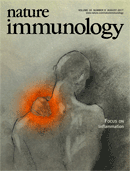Advertisement |  | Open for Submissions
npj Precision Oncology is a new open access, online-only, peer-reviewed journal committed to publishing cutting-edge scientific research in all aspects of precision oncology from basic science to translational applications, to clinical medicine. The journal is part of the Nature Partner Journals series and published in partnership with The Hormel Institute, University of Minnesota.
Explore the benefits of submitting your manuscript. |  | | |  |  | TABLE OF CONTENTS
| August 2017 Volume 18, Issue 8 |  |  |  |  |  Focus Focus
 Editorial Editorial
 Comment Comment
 Reviews Reviews
 News and Views News and Views
 Research Highlights Research Highlights
 Articles Articles
 Corrigenda Corrigenda
 Errata Errata |  | Advertisement |  |  |  | 
Open for Submissions
Online-only and open access, npj Primary Care Respiratory Medicine is the only fully-indexed scientific journal devoted to the management of respiratory diseases in primary care.
Explore the benefits of submitting your next research article. | | |
|
|  | |  |  | | Advertisement |  | npj Vaccines is an online-only, open access, multidisciplinary journal dedicated to publishing cutting-edge research and development on human and veterinary vaccines. npj Vaccines is now open for submissions.
Explore the benefits of submitting your next manuscript to the journal. |  | | |  | | | Focus |  Top Top |  |  |  |  | | | | Nature Immunology presents a series of specially commissioned articles discussing the newest insights into the tissue-specific characteristics of inflammation, the roles of microbiota and nutrition in driving inflammation, and the mechanistic and genetic bases of inflammation resolution and autoinflammation. | |
|
 |
 |
Editorial |  Top Top |
 |
 |
 |
Focus on Inflammation
A current view on inflammation p825
doi:10.1038/ni.3798
Evolving mechanistic and conceptual understanding of inflammation drives insight into human disease and new approaches for therapy. |
 |
Comment |  Top Top |
 |
 |
 |
Focus on Inflammation
A guiding map for inflammation pp826 - 831
Mihai G Netea, Frances Balkwill, Michel Chonchol, Fabio Cominelli, Marc Y Donath et al.
doi:10.1038/ni.3790
Netea and colleagues provide a general guide to the cellular and humoral contributors to inflammation as well as the pathways that characterize inflammation in specific organs and tissues. |
 |
Reviews |  Top Top |
 |
 |
 |
Focus on Inflammation
The monogenic autoinflammatory diseases define new pathways in human innate immunity and inflammation pp832 - 842
Kalpana Manthiram, Qing Zhou, Ivona Aksentijevich and Daniel L Kastner
doi:10.1038/ni.3777
Kastner and colleagues review monogenic autoinflammatory diseases and their molecular mechanisms and explore the overlap among autoinflammation, autoimmunity and immunodeficiency. |
 |
 |
 |
Focus on Inflammation
Nutrition, inflammation and cancer pp843 - 850
Laurence Zitvogel, Federico Pietrocola and Guido Kroemer
doi:10.1038/ni.3754
Kroemer and colleagues discuss the mechanisms through which nutrition modulates metabolic, microbial and neuroendocrine circuitries that affect cancer development and the response to treatment. |
 |
 |
 |
Focus on Inflammation
Regulation of inflammation by microbiota interactions with the host pp851 - 860
J Magarian Blander, Randy S Longman, Iliyan D Iliev, Gregory F Sonnenberg and David Artis
doi:10.1038/ni.3780
Magarian Blander and colleagues review the effects of the microbiome on innate and adaptive immunological players and how microbiota-derived bioactive molecules affect inflammation and the host response to infection, vaccination and cancer. |
 |
 |
 |
Focus on Inflammation
Limiting inflammation—the negative regulation of NF-κB and the NLRP3 inflammasome pp861 - 869
Inna S Afonina, Zhenyu Zhong, Michael Karin and Rudi Beyaert
doi:10.1038/ni.3772
Beyaert, Karin and colleagues discuss the key molecular mechanisms that contribute to the self-limiting nature of inflammatory signaling, with emphasis on the negative regulation of the NF-κB pathway and the NLRP3 inflammasome. |
 |
News and Views |  Top Top |
 |
 |
 |
|
 |
Research Highlights |  Top Top |
 |
 |
 |
Non-inflammatory IFN | Alzheimer's disease microglia | Inducing fetal tolerance | NF-κB citrullination | MAIT cell heterogeneity | Breaking down barriers |
| Advertisement |
 |
| |
 |
| |
Articles |  Top Top |
 |
 |
 |
Lineage specification of human dendritic cells is marked by IRF8 expression in hematopoietic stem cells and multipotent progenitors pp877 - 888
Jaeyop Lee, Yu Jerry Zhou, Wenji Ma, Wanwei Zhang, Arafat Aljoufi et al.
doi:10.1038/ni.3789
Liu and colleagues show that specification of the dendritic-cell lineage occurs in parallel with specification of the myeloid and lymphoid lineages in or around the hematopoietic-stem-cell stage, starting as a lineage bias defined by transcriptional programs that correlate with the combinatorial dose of IRF8 and PU.1.
See also: News and Views by Yanez et al. |
 |
 |
 |
IgG Fc domains that bind C1q but not effector Fcγ receptors delineate the importance of complement-mediated effector functions pp889 - 898
Chang-Han Lee, Gabrielle Romain, Wupeng Yan, Makiko Watanabe, Wissam Charab et al.
doi:10.1038/ni.3770
Monoclonal antibody (mAb) therapy is now commonplace in the clinic, yet such reagents can elicit unwanted side effects due to interactions with Fcγ receptors. Georgiou and colleagues have engineered mAbs that lack such FcγR interactions but retain the ability to activate complement and show that these modified mAbs have efficacious effector function.
See also: News and Views by van der Poel & Carroll |
 |
 |
 |
Essential role for GABARAP autophagy proteins in interferon-inducible GTPase-mediated host defense pp899 - 910
Miwa Sasai, Naoya Sakaguchi, Ji Su Ma, Shuhei Nakamura, Tsuyoshi Kawabata et al.
doi:10.1038/ni.3767
Various intracellular pathogens attempt to hide from innate cytosolic sensors by forming vacuoles. Yamamoto and colleagues show that the autophagy-related protein Gate-16, which is induced by interferon-γ, is required for noncanonical autophagy to control infection by Toxoplasma gondii. |
 |
 |
 |
The BTG2-PRMT1 module limits pre-B cell expansion by regulating the CDK4-Cyclin-D3 complex pp911 - 920
Elmar Dolezal, Simona Infantino, Friedel Drepper, Theresa Börsig, Aparajita Singh et al.
doi:10.1038/ni.3774
Expression of a competent Igh heavy chain initiates a pre-BCR checkpoint during B cell development. Reth and colleagues show that protein arginine methylation by a BTG2-PRMT1 complex is required to inactivate CDK4 and thereby establish pre-B cell arrest. |
 |
 |
 |
Germinal-center development of memory B cells driven by IL-9 from follicular helper T cells pp921 - 930
Yifeng Wang, Jingwen Shi, Jiacong Yan, Zhengtao Xiao, Xiaoxiao Hou et al.
doi:10.1038/ni.3788
Germinal centers generate high-affinity memory B cells. Qi and colleagues identify a precursor of memory B cells in germinal centers and demonstrate that the cytokine IL-9-derived from follicular helper T cells is important for their development into full-fledged memory cells. |
 |
 |
 |
The transcription factor Runx3 guards cytotoxic CD8+ effector T cells against deviation towards follicular helper T cell lineage pp931 - 939
Qiang Shan, Zhouhao Zeng, Shaojun Xing, Fengyin Li, Stacey M Hartwig et al.
doi:10.1038/ni.3773
Xue and colleagues show that Runx3-/- CD8+ T effector cells aberrantly upregulate genes characteristic of TFH cell lineage and exhibit impaired induction of cytotoxic molecules. |
 |
 |
 |
Tissue-resident memory features are linked to the magnitude of cytotoxic T cell responses in human lung cancer pp940 - 950
Anusha-Preethi Ganesan, James Clarke, Oliver Wood, Eva M Garrido-Martin, Serena J Chee et al.
doi:10.1038/ni.3775
Vijayanand and colleagues use genome-wide RNA sequencing for transcriptional profiling of CD8+ T cells from tumors and adjacent uninvolved lung tissue from patients with early-stage lung cancer. A tissue-resident memory signature is associated with enhanced cytotoxicity and improved survival.
See also: News and Views by Amsen et al. |
 |
| Advertisement |
 |
| |
 |
| |
Corrigenda |  Top Top |
 |
 |
 |
Corrigendum: TCRα-TCRβ pairing controls recognition of CD1d and directs the development of adipose NKT cells p951
Joshua A Vieth, Joy Das, Fanomezana M Ranaivoson, Davide Comoletti, Lisa K Denzin et al.
doi:10.1038/ni0817-951a |
 |
 |
 |
Corrigendum: Spontaneous partial loss of the OT-I transgene p951
Gretchen Harms Pritchard, Eric W Cross, Marjorie Strobel, Stephen C Jameson, Ross M Kedl et al.
doi:10.1038/ni0817-951b |
 |
Errata |  Top Top |
 |
 |
 |
Erratum: Gut microbial metabolites limit the frequency of autoimmune T cells and protect against type 1 diabetes p951
Eliana Mariño, James L Richards, Keiran H McLeod, Dragana Stanley, Yu Anne Yap et al.
doi:10.1038/ni0817-951c |
 |
 |
 |
Erratum: Ontogeny and homeostasis of CNS myeloid cells p951
Marco Prinz, Daniel Erny and Nora Hagemeyer
doi:10.1038/ni0817-951d |
 |
 |
 |
Erratum: NLRP12 attenuates colon inflammation by maintaining colonic microbial diversity and promoting protective commensal bacterial growth p951
Liang Chen, Justin E Wilson, Mark J Koenigsknecht, Wei-Chun Chou, Stephanie A Montgomery et al.
doi:10.1038/ni0817-951e |
 |
 Top Top |
 |
 |
| Advertisement |
 |
HIV IMMUNITY AND ERADICATION,
A HERRENHAUSEN SYMPOSIUM
November 2-3, 2017 | Hanover, Germany
REGISTER NOW! |  | | |
 |
| |
 |  |  |  |  |  | Natureevents is a fully searchable, multi-disciplinary database designed to maximise exposure for events organisers. The contents of the Natureevents Directory are now live. The digital version is available here.
Find the latest scientific conferences, courses, meetings and symposia on natureevents.com. For event advertising opportunities across the Nature Publishing Group portfolio please contact natureevents@nature.com |  |  |  |  |  |
|
 |


No comments:
Post a Comment